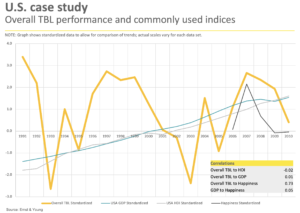Birthplace & Historical Archive of Multicapitalism & Context-Based Accounting
 Aggregate Capital Sufficiency (ACS)
Aggregate Capital Sufficiency (ACS)
.
Although most if not all economists agree that Gross Domestic Product (GDP) is not, and never was, intended to be a measure of the well-being of a society, some still treat it that way. The fact is that GDP expresses the size of an economy in terms of the monetary value of goods and services produced and sold within it, the extent of which may or may not correlate with human well-being. Not everything produced or sold in an economy contributes to well-being, and not everything that contributes to human well-being is counted in GDP.
Because of its shortcomings as an indicator of human well-being, many alternatives to GDP have been proposed, including:
The Index of Sustainable Economic Welfare (ISEW)
The Genuine Progress Indicator (GPI)
Gross National Happiness (GNH)
The Human Development Index (HDI)
In general, these alternatives either (a) comprise different ways of measuring the size of economies, or (b) do indeed quantify, rate and/or rank levels of human well-being, albeit in relative or incremental terms only.
None of that, however, provides us with ways of assessing the sustainability of communities, nations or economies in more literal or context-based terms. To do that, measurement must explicitly address human impacts on the quality and sufficiency of vital resources in the world (capitals) relative to sustainability standards of performance, and the implications for human well-being.
This is fully in accord with multicapitalism, a new economic doctrine that interprets performance in terms of human impacts on all vital capitals (natural, human, social, etc.), not just one of them (economic). And while it is true that many of the sustainability problems we face today are attributable to capitalism, it (capitalism, per se) is not the problem – rather, monocapitalism is the problem and multicapitalism is the solution. Even stakeholder and regenerative capitalism are predicated on multicapitalism, explicitly or otherwise.
To operationalize multicapitalism, two things must happen: (1) individual organizations must embrace authentic triple bottom line accounting tools – such as the MultiCapital Scorecard – for assessing their own performance, and (2) governments and public policymakers must at least supplement their use of GDP with alternative measures of the manner in which human activity, in the aggregate, affects the quality and/or sufficiency of vital capitals in the world.
At CSO, we have long contributed to development of the former. Now, in addition, we have turned our attention to the latter. Aggregate Capital Sufficiency (ACS) is the result. ACS is an alternative to GDP that assesses the sustainability of communities, nations and economies by dint of the effects they have on the sufficiency of vital capitals. No other measurement system does this, and yet it must be done if humanity is to have any chance of achieving sustainability in the conduct of its own affairs. Indeed, we cannot manage performance in the new economy using accounting tools forged in the old one!
For an illustration of ACS in action, see this report on a pilot we performed with Ernst & Young in 2017: Aggregate Capital Sufficiency and National Well-Being
The Center for Sustainable Organizations
What differentiates CSO from others in the sustainability arena is its strong commitment to an approach for corporate sustainability measurement, management and reporting that is context-based
